WORLD: Mr Djir-Sarai, the FDP Presidium has decided to make the Bundeswehr more attractive as an employer. What ideas have you developed for this?
Bijan Djir-Sarai: We took the anniversary of the turning point as an opportunity to assess the situation: where do we stand, what has been achieved and where should the journey go? With regard to the Bundeswehr, we have made it clear that the introduction of conscription is not an option for us, but that we propose other options to improve the difficult personnel situation in the armed forces.
We want to strengthen the reserve, make the Bundeswehr more attractive as an employer and increase social acceptance through pledges in public places. It's about more visibility for the Bundeswehr, and we also want to make it clear that we're proud of our soldiers.
WORLD: These are measures that have already been decided several times in recent years. Wouldn't the most important boost in attractiveness finally be adequate equipment?
Djir-Sarai: In recent decades, the Bundeswehr has been kept small under the leadership of the CDU. Fatally, for a long time there was the conviction in parts of politics and society that we actually no longer need the armed forces. The current state of the force is a reflection of this wrong thinking. Only Russia's brutal war of aggression brought about a rethink, including among our coalition partners.
That is why we are finally moving noticeably in the direction of the two percent spending target, not least thanks to the 100 billion euro special program. Unfortunately, a lot of time was wasted in the implementation in the first year of government. The new Defense Minister Boris Pistorius (SPD, ed.) has a lot of catching up to do, especially in procurement and the encrusted structures. The turning point must arrive in the barracks. But I would like to emphasize: It's not because of the money, it's available.
WORLD: It doesn't stand. According to the financial requirements analysis, the investment requirement is around 300 billion euros by 2032. In the traffic light debt fund, there are 87 billion euros less interest charges. And the military budget, minus personnel and operating costs, provides for annual investments of ten billion euros...
Djir-Sarai: Nevertheless, the 100 billion euros is a sum that no government has yet been able to bring itself to bear. And we are currently discussing the budget for 2024. I see a broad majority in favor of increasing the funds for the Bundeswehr in the long term. Let's think ahead. What if the next American administration says in a year and a half: The war in Europe is your business, we are concentrating on China?
The truth is: Europe is currently unable to guarantee its security without the Americans. Without the Americans, Ukraine would not be able to defend itself so successfully. This means that we are almost forced to invest more in Europe's security architecture in the long term. And the Bundeswehr is a crucial pillar here.
WORLD: Pistorius wants ten billion euros more for the Bundeswehr. The FDP wants ten billion for the share pension, Family Minister Paus wants twelve billion for basic child security. How is that supposed to work with the debt brake?
Djir-Sarai: The debt brake is a requirement of the Basic Law. And it is indispensable, especially in view of the inflation and the flood of debt in recent years. Today in the euro area we have an interest rate development that makes borrowing extremely expensive again.
If we go further into debt, we will give up our political ability to act at the expense of future generations. And by the way: everything should be sustainable in these times, except financial policy? That would be absurd.
WORLD: In 2022, the traffic light suspended the debt brake with reference to an extraordinary emergency situation, the war in Ukraine. Why shouldn't that work now?
Djir-Sarai: Last year it was about acute crisis management policy, just think of the energy costs. We drew on our good substance there. In 2023 it must be a question of strengthening this substance again, we must make Germany fit for the future as a business location. Our coalition partners tend to forget that it has to be generated before it can be distributed. I also want the ecological transformation of the economy, and I'm also in favor of strong social security systems.
But everyone in this coalition is called upon to say very specifically how the relevant projects should be financed. Suspension of the debt brake or tax increases are not options because they damage Germany as a business location and are not fair to the generations. Energy costs are at a much higher level than before the Russian war of aggression.
Many companies are therefore thinking about migrating. If location costs continue to increase, jobs will be destroyed – and with them our prosperity. Also because other location advantages such as skilled workers or uncomplicated procedures are unfortunately still scarce in Germany. So it is not the time for distribution politics. The focus now is on measures that generate growth. A core project is accelerated planning procedures.
WORLD: Transport Minister Volker Wissing (FDP) has been meeting resistance from Green Environment Minister Steffi Lemke for months, who wants to exempt road projects from the acceleration. Does the chancellor have to tie the knot?
Djir-Sarai: The SPD parliamentary group also emphasized at the beginning of the year that there should be no distinction between bad and good infrastructure, but that we need more speed everywhere. I think it would be good if the chancellor followed suit. We don't live in Bullerbü!
Germany is one of the most important economies in the world, we need rails, waterways and roads that simply work. After all, nothing has been achieved in terms of climate protection if we build roads more slowly than necessary and people are constantly stuck in traffic jams. Germany needs mobility in all dimensions to be competitive - and not an ideological fight against the car.
WORLD: At the urging of the FDP, the government has now cleared the way for e-fuels in Germany. Will Germany also permanently stop the end of combustion engines at EU level?
Djir-Sarai: The fact that CO₂-neutral fuels are finally allowed is a great success both for climate protection and for transport policy. We must now also achieve this at EU level, and I am very confident about that. The debate about openness to technology is also taking place in Italy, Poland and other EU countries.
Climate protection goals must be achieved, and with a total ban we would rob ourselves of opportunities. And we would destroy jobs and know-how. In countries like China and the USA there will be competition for the best green environmental technologies. We should accept this competition - and not demonize certain technologies because we as politicians think we know better.
Federal Transport Minister Volker Wissing wants to block the EU plans to phase out combustion engines. Accordingly, from 2035 no new combustion cars should come onto the market. According to Wissing, however, the use of synthetic fuels must also be possible after 2035.
Source: WORLD
WORLD: This week, the Greens presented new ideas for banning oil and gas heating and for advertising children about unhealthy food. Do you agree?
Djir-Sarai: Clearly: no.
WORLD: In migration policy, an imbalance can be seen in the traffic light plans: simplifications in the immigration of skilled workers and citizenship law are on the way, and there is no discernible concept for preventing irregular migration to Germany. Or?
Djir-Sarai: The Federal Government's special representative for migration agreements (FDP politician Joachim Stamp, ed.) recently started work. In addition, Europe must improve border protection, for example by giving Frontex more powers and finally reforming the Common European Asylum System. We really need a fresh start in migration policy in Germany.
Countries like the USA, Canada or New Zealand conduct the migration debate very factually and very matter-of-factly. Unfortunately, in Germany we always make the mistake of managing them in a highly emotional manner. A country must clearly define which forms of migration it needs – and which it doesn’t. You have to be able to say that.
WORLD: Well then.
Djir-Sarai: We need the immigration of skilled workers, namely the best minds and the hardest-working hands worldwide. Unfortunately, we are not yet attractive enough, the federal government is working on that now. On the other hand, we do not need immigration into the social security systems. Unfortunately, these are disproportionately common.
The people in our country are cosmopolitan and tolerant. But they rightly want to know who is coming to us, they want direction, control and the rule of law when it comes to immigration. That is what politics must deliver - and not repeat the catastrophic mistakes of the Merkel era.
WORLD: Isn't that exactly what's happening?
Djir-Sarai: Progress since 2015 has been very modest. And unfortunately the incumbent Interior Minister Faeser (SPD, ed.) put the brakes on again at the European Council a few weeks ago, when the question of Europe's ability to protect borders was very specifically at stake. Germany lost a lot of trust because of the former chancellor's solo efforts in Europe. We would do well to listen more to our partners on the external borders now.
WORLD: Do we need further service life extensions for nuclear power plants for Germany's energy security? Or has the FDP come to terms with the fact that nuclear energy will end in Germany on April 15 of this year?
Djir-Sarai: If it weren't for the FDP, the three nuclear power plants available on the grid would have been shut down long ago and wouldn't even run until April 15th. Personally, I am convinced that this will not be enough and that we will continue to need nuclear energy until the expansion of renewable energies has progressed sufficiently. I wish that our coalition partners would follow the vast majority of EU countries on this issue as well.
Nobody in Europe can understand why a country like Germany does not want to make use of the instrument of extending the service life after mid-April and instead relies on climate-damaging coal - although we all want to become independent of Russian oil and gas together. This is also a question of European solidarity. And for the Greens, this contradiction cannot be explained anyway, at least not from the point of view of climate protection.
WORLD: We dare to predict that the FDP with all these positions in the traffic light will at best be able to assert itself in individual points. Is that why you failed badly in the recent elections?
Djir-Sarai: I see no connection there. We are part of a coalition, but unfortunately we did not get an absolute majority in the last federal election. So we have to make compromises. As General Secretary of the FDP, however, I take the liberty of presenting our positions clearly.
And I am sure that we will achieve so much in this government that we will be able to appear before the citizens in the next federal election with a very good record. My goal is for us to get back over ten percent. You can measure me by that.
"Kick-off" is WELT's daily news podcast. The most important topic analyzed by WELT editors and the dates of the day. Subscribe to the podcast on Spotify, Apple Podcasts, Amazon Music, Google Podcasts, among others, or directly via RSS feed.

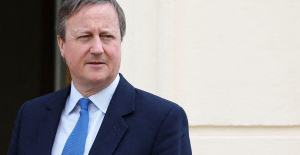 Iran-Israel: David Cameron wants the G7 to impose “coordinated sanctions” on Iran
Iran-Israel: David Cameron wants the G7 to impose “coordinated sanctions” on Iran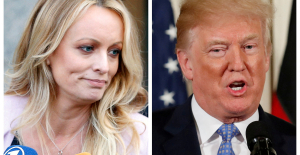 Donald Trump trial: who is Stormy Daniels, the ex-porn star who makes the former American president tremble?
Donald Trump trial: who is Stormy Daniels, the ex-porn star who makes the former American president tremble?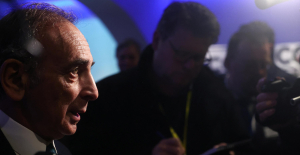 The day after their conference in Brussels was banned, the nationalist right won their case
The day after their conference in Brussels was banned, the nationalist right won their case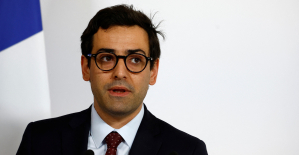 Summoning the Iranian ambassador: how the dissemination of “fake news” forced Stéphane Séjourné to react
Summoning the Iranian ambassador: how the dissemination of “fake news” forced Stéphane Séjourné to react New generation mosquito nets prove much more effective against malaria
New generation mosquito nets prove much more effective against malaria Covid-19: everything you need to know about the new vaccination campaign which is starting
Covid-19: everything you need to know about the new vaccination campaign which is starting The best laptops of the moment boast artificial intelligence
The best laptops of the moment boast artificial intelligence Amazon invests 700 million in robotizing its warehouses in Europe
Amazon invests 700 million in robotizing its warehouses in Europe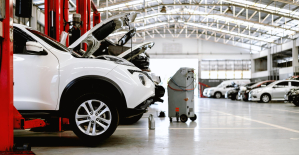 Planned obsolescence: an association warns of the risk of seeing the development of “disposable cars”
Planned obsolescence: an association warns of the risk of seeing the development of “disposable cars” In the private sector, 42% of employees took sick leave last year
In the private sector, 42% of employees took sick leave last year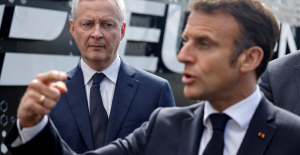 Growth, savings, inflation... These very optimistic forecasts from the government which worry the Court of Auditors
Growth, savings, inflation... These very optimistic forecasts from the government which worry the Court of Auditors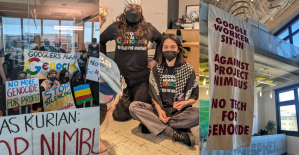 In the United States, Google employees demonstrate to demand the repeal of a cloud contract with Israel
In the United States, Google employees demonstrate to demand the repeal of a cloud contract with Israel Gaby, a new play by Pagnol adapted into a comic strip
Gaby, a new play by Pagnol adapted into a comic strip British Taylor Swift fans lose hundreds of euros in counterfeit notes
British Taylor Swift fans lose hundreds of euros in counterfeit notes Celine Dion promises a “raw and honest” film about her illness and her life as an artist
Celine Dion promises a “raw and honest” film about her illness and her life as an artist New York Philharmonic Orchestra Continues Concert Despite Earthquake Warnings
New York Philharmonic Orchestra Continues Concert Despite Earthquake Warnings Skoda Kodiaq 2024: a 'beast' plug-in hybrid SUV
Skoda Kodiaq 2024: a 'beast' plug-in hybrid SUV Tesla launches a new Model Y with 600 km of autonomy at a "more accessible price"
Tesla launches a new Model Y with 600 km of autonomy at a "more accessible price" The 10 best-selling cars in March 2024 in Spain: sales fall due to Easter
The 10 best-selling cars in March 2024 in Spain: sales fall due to Easter A private jet company buys more than 100 flying cars
A private jet company buys more than 100 flying cars This is how housing prices have changed in Spain in the last decade
This is how housing prices have changed in Spain in the last decade The home mortgage firm drops 10% in January and interest soars to 3.46%
The home mortgage firm drops 10% in January and interest soars to 3.46% The jewel of the Rocío de Nagüeles urbanization: a dream villa in Marbella
The jewel of the Rocío de Nagüeles urbanization: a dream villa in Marbella Rental prices grow by 7.3% in February: where does it go up and where does it go down?
Rental prices grow by 7.3% in February: where does it go up and where does it go down? Europeans: the schedule of debates to follow between now and June 9
Europeans: the schedule of debates to follow between now and June 9 Europeans: “In France, there is a left and there is a right,” assures Bellamy
Europeans: “In France, there is a left and there is a right,” assures Bellamy During the night of the economy, the right points out the budgetary flaws of the macronie
During the night of the economy, the right points out the budgetary flaws of the macronie Europeans: Glucksmann denounces “Emmanuel Macron’s failure” in the face of Bardella’s success
Europeans: Glucksmann denounces “Emmanuel Macron’s failure” in the face of Bardella’s success These French cities that will boycott the World Cup in Qatar
These French cities that will boycott the World Cup in Qatar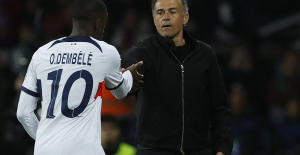 Barça-PSG: legendary match, the Parisian mentality, Donnarumma not serene… Favorites and scratches
Barça-PSG: legendary match, the Parisian mentality, Donnarumma not serene… Favorites and scratches Basketball: Poupet, the Villeurbanne coach, extends
Basketball: Poupet, the Villeurbanne coach, extends Barça-PSG: “Mbappé super”, the European press is delighted with the Frenchman’s return to the forefront
Barça-PSG: “Mbappé super”, the European press is delighted with the Frenchman’s return to the forefront Rugby: Antoine Dupont provides support to a young player seriously injured and plunged into an artificial coma
Rugby: Antoine Dupont provides support to a young player seriously injured and plunged into an artificial coma


















